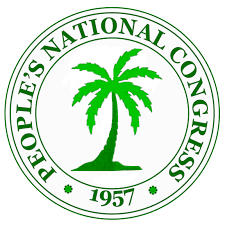The People’s National Congress Reform (PNCR) has expressed worry about the inability or reluctance of the government to shed light on whether or not ExxonMobil is charging interest on its investments in the Stabroek Block and, if so, at what interest rate, and as such is calling on the administration to clarify this issue for the benefit of the Guyanese people.
In a release yesterday, the PNCR stated its opinion that the reluctance of Vice President Bharrat Jagdeo to fully disclose information on this matter has gone beyond ‘eye pass’with it being more than likely that he himself is not on top of the situation and, worse, “does not care to be… his disdain for his responsibilities as the PPP’s oil autocrat thus represents an assault on the well-being of every Guyanese.”
It also pointed out that the matter of interest payments can potentially amount to billions of US dollars in revenue leakages, bearing in mind that given the many tens of billions of US dollars involved in developing Guyana oil fields, an interest rate of even five per cent would result in a huge expense. Such monies, it contends, could instead be used to alleviate the cost of living crisis, raise salaries, eradicate poverty, and meet many other urgent needs.
In an effort to explain the party’s concerns, the release made reference to Annex C of the 2016 Production Sharing Agreement (PSA), which states that interest expenses are recoverable without the approval of the minister, so long as they are “consistent with market rates.” However, it was pointed out, the first Exxon audit, commissioned by the Coalition Government, explicitly declares on Page 4 that the company did not recover any interest expenses. It read, “Interest and financing costs are recoverable under the 2016 PSA. However, EEPGL confirmed during the audit period that no interest or financing charges have been included in cost recovery- the audit team has confirmed that no interest or financing costs are included in the amount presented in the Q4 2017 cost recovery statement.” Such an explicit and direct statement, the release noted, is however missing in the second Exxon Audit, commissioned by the PPP to cover US$7.3 billion in the 2018-2020 period.
It also highlighted that because the PSA allows interest expenses to be recoverable without the approval of the minister, any audit that lacks necessary thoroughness will not automatically flag them when they appear in the cost recovery bank. This in the PNCR’s view is what Jagdeo “seems not to grasp (or cares not to)”
Explaining further, it noted that when the Stabroek Block operator says Guyana is not being charged interest on developments, therefore, an audit which follows the letter of the PSA may not directly reveal whether or not this is the case. As a result, it is, at minimum, incumbent upon the Government of Guyana to monitor quarterly expense reports to identify whether interest is being charged and to raise this issue with the operator if it are not living up to its word.
Therefore, while the audit commissioned by the Coalition government specifically addresses the interest issue – highlighting that interest was not charged for pre-contract costs – the one done under the PPP makes no such direct reference to interest. Rather, in addressing the issue of withholding tax (Exception 17), it tangentially suggests that interest is being charged. This, the release contends, raises several questions, chief among them, is whether this is indeed the case, what the interest rate is, and how it compares with market rates.
Based on its explanations, the party is critical of the Vice President’s
handling of the matter. “It does not require much effort on the part of Jagdeo to clarify the situation. The people of Guyana must so demand. His cavalier approach to this matter and others in the oil sector amounts to a criminal dereliction of duty. Billions of US dollars of the national patrimony are at stake.”
The release suggested that going forward, auditors must be instructed to look closely at the issue of interest and provide detailed and specific commentary. In addition, the government must also keep a close eye on expense reports to note any interest charges and if interest is indeed being charged, they must engage the Operator for the recovery of these funds, and report this to the nation. Simply put, it argues, the government cannot afford to continue “blindly” when so much is at stake.








